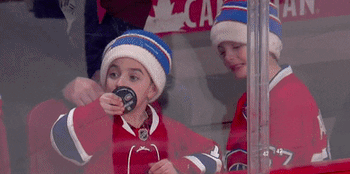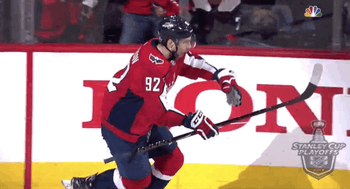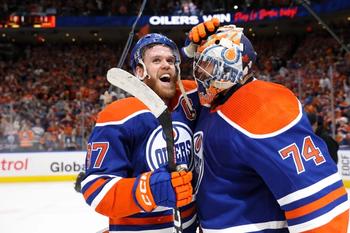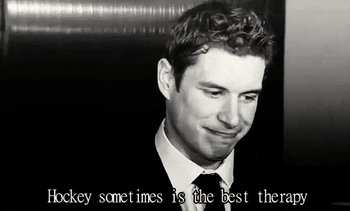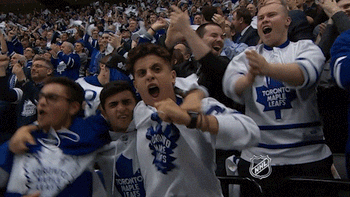Podcast Episode 32: Sexism and homophobia in sports? No way!
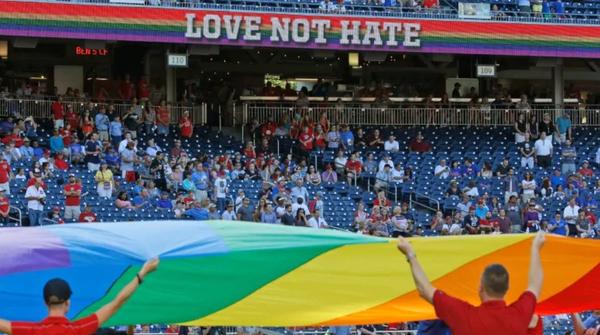
Listen to this episode of The GIST of IT here.
Ellen: What is up GISTers? Welcome to The GIST of It, I'm Ellen Hyslop.
Steph: And I'm Steph Rotz.
Ellen: And we're just two old pals and two gals here to give you the gist of what's going on in the sports world, we're super happy to have you here.
Ellen: Steph, what a week, what a day. We've already talked about this, but I've got to say, I'm recovering from some sort of food poisoning or sickness. I don't know what's going on, but I'm going to do my best to live off of this ginger ale and bring the energy and bring the heat that we need today.
Steph: I feel you I mean, you've got it worse than me. I have a migraine, so at least I can pull through with some Tylenol. But we got this Ellen.
Ellen: We got this. There must be something, you know, messing up with our Libra horoscope today, just like 'these guys just don't get it today.'But that's fine. We never have anything like this. So we've just got to work through it.
Steph: Mm hmm. We're recording on Tuesday, August 25th. And while there are definitely a few things to celebrate and positive things to talk about within the world of sports, we certainly do need to take today's podcast to talk about some heavy topics. So before we get into those heavy topics, let's start with a little bit of those positive vibes. So first, the NWSL just announced an 18 game fall series from September 5th to October 17th to kind of go off of the momentum that they had earlier this year with their return to play. So that's exciting.
Ellen: Super exciting. It's also very interesting because of what we talked about in the last podcast with a lot of players moving over to Europe to play soccer over there. And a lot of the NWSL teams had loaned their players also to Europe. So I'm super interested to see how long players are going to be over there or if they're going to come back to play it'll be really cool.
Also speaking about soccer, we have to give a big shout out to our Canadian guy, Alfonso Davies, who became the first Canadian ever to win the UEFA Champions League title. He won that this weekend after his club, FC Bayern Munich (FC stands for football club in the soccer world) defeated Paris St. Germain FC, which is more commonly known as PSG. And so this is the biggest game in European League Soccer/football. And so I think that it's super cool that Alfonso, a kid from Edmonton, is doing that and is the first guy to do it.
Ellen: Kadeisha Buchanan as a woman has done that three times over. So, you know, not the first Canadian ever to do it, but you got to give a shout out to him and the rest of his teammates.
Steph: Love that annotation there Ellen, always great, got to acknowledge the women. And the NBA playoffs have been a lot of fun this past week to watch. We did get three sweeps in the Eastern Conference. You know Miami took one, Toronto, Boston. But in the West, we've got some contenders going on and everyone's talking about the magic that is Luka Doncic of the Dallas Mavericks and that buzzer beater that he got in, which has gotten quite a bit of coverage. So I encourage you, pop her in the Google, go to your GIST newsletter and check out what that looked like.
Ellen: It was wild.
Steph: Oh, jeez. Against the Clippers there too. So we've got some history with buzzer beaters on that team as well, with Kawhi Leonard. But thinking along the lines of what WNBA or sorry, NBA whoo look at me, got the W in my head always. What NBA Oklahoma City Thunder star Chris Paul said after their game four this past week, that's all good and well, it's great to talk about the wins of basketball and what's going well with basketball, but there's a lot more going on right now that we do have to talk about that both Chris Paul, LeBron, Raptor Fred VanVleet, Norman Powell, Milwaukee Bucks guard George Hill and a bunch of other NBA players are currently speaking out about, which is the fact that Black lives continue to be taken by police in North America. While sports are back, we as sports community, we as sports fans need to keep top of mind this injustice while we've got Black Lives Matter painted on the court for the NBA, we have to kind of walk the walk there, and today we think of the senseless shooting of Jacob Blake, a Black man who was shot in the back seven times by police officers in Wisconsin and is now paralyzed from the waist down. And inside the sports world we also have now seen the body cam footage of Toronto Raptors President Masai Ujiri confirming what we already knew, which was that President Ujiri was shoved by a security guard the night of the Raptors win.
Ellen: You know, Steph it's 2020, and it's been a massive year of uncovering and of people supposed to be learning, supposed to be bettering themselves, understanding the issues of society built on this foundation of the white patriarchy. And yet, you know, here we are, there's some progress, but there's also so many things that are just staying the same or getting worse.
Steph: Mm hmm. Yeah. Today on the pod, for those who may have missed it, we're going to get into hockey color commentator Mike Milbury's sexist statements during an NHL game and Tom Brennaman homophobic statements during an MLB game. So let's get to it.
Ellen: Let's start with talking about Mike Milbury and the NHL, and before we get into it, I think that it's important to say exactly what happened and to really give the gist of the entire situation. So Mike Milbury is a 68 year old white man. He played in the NHL for 12 years. He was also an assistant general manager and a general manager in the league. He was general manager for the Boston Bruins and then the New York Islanders respectively. And most recently, he was a color commentator on NBC Sports for their NHL games.
And so fast forward to August 20th. He was commentating on the Washington Capitals and New York Islanders game, which FYI, the Islanders just completely dummied the Caps and moved on to the second round, which was a complete surprise. But outside of that, anyway, him and his analysts were talking about the competitive advantages of playing in the bubble and those advantages that the bubble presented. And so his other fellow analyst, Boucher, was talking about, if players enjoy playing a lot and if they enjoy being with their teammates for long periods of time, the bubble is a perfect place to be. Totally fair, completely valid statement, agree with it. To that, Milbury said "not even any women here to disrupt your concentration."
Steph: Nah, I'm glad we're recording this a couple of days later because I really had to collect myself and my anger after that. Just oof. I think it's really, really easy for a lot of folks to dismiss this comment as something flippant that he said off the cuff. But what it really truly is, is cultural and casual misogyny. And when you say something so reactively and so instinctively, like women are a distraction to men's productivity, let's say, that means that that thought has existed in your brain and marinated in your brain for time and time. And you believe it's true. There's some level that you believe that that is inherently how the world works.
And while it may have been like, what, four seconds of air time, those four seconds so quickly illustrate a historic belief that it's OK to dehumanize women, because let's be honest, that is such a dehumanizing thing to hear. It affirms an archaic belief that men don't have control over their sexual desires. It easily can be connected...this line of thinking can easily be connected to victim blaming in sexual assault. It exposes the privilege that so many men have had for so long to just have the capacity to focus on work like just work, like imagine that. And it assumes that women don't work in sports, which is hilarious. Like there's obviously women in this frickin bubble and it assumes that all male athletes are straight. It assumes we don't need love and affection to thrive.
There are so many things that you can untangle. And I could go on and on about what this four second clip truly actually means. It's a spider web and like a mind map that connects all of these systemic problems. And it's such a quick comment, but it tells you so much about hockey's history and it just takes a moment of reflection for us to see that.
Ellen: Absolutely, and Milbury, in so many ways because of who he is as a player, as an analyst, as a GM, represents so much of hockey culture and he has the ears of millions and millions of people that are tuning in to watch games. Millions of people saw that and listened to that clip.
And what's really frustrating too Steph is that Milbury is not new to this shit. This is super commonplace for him in these very same playoffs he compared the bubble's spectator-less atmosphere to women's college hockey, like that alone should have already just kicked him off the air for saying something like that.
Steph: Let's not forget that Don Cherry has said some shady shit for decades on air, too, and it took so long to get him off the air. And while it's great to see that the NHL is actually putting out statements like apology statement and saying that they don't stand for this type of behavior or this type of language, and they're doing that now, it's great to see that. But Milbury completely represents that old school tough, one minded atmosphere in hockey.
Like back in 2016, Milbury said "if you're going to slash him, break a bone. If you're going to hit him from behind, give him a slight concussion." This is such a dangerous line of thought. And these are such serious comments that have so much weight and expose so much about hockey that keep people out of the sport. They keep so many other people who could enjoy the sport out of it.
Ellen: It's not a safe place when you hear things like that. It's just not something that you want to be going out and playing if you know that you're going to be subjected to all those types of things. And let's let's also talk about his apology Steph. And I'm putting that in air quotes because he tweeted, "In light of the attention caused by my recent remark, I've decided to step away from my role at NBC Sports for the remainder of the Stanley Cup Playoffs. I do not want my presence to interfere with the athletes as they try to win the greatest trophy in sports."
My question is, where the fuck is the apology in this? He did not apologize for that recent remark. He was just kind of like in light of my recent remark, he didn't say that he did anything wrong. And he... I don't know to me in some sort of way with some of the other statements, too, it seems like he's still just leaning into "I'm that irreverent guy who's going to say something controversial and I'm just going to get away with it."
Steph: Like either this grown man doesn't know the anatomy of an apology and should just flop that into the old Google my goodsir or he just truly does not care to take responsibility for what he said.
Ellen: Oh, yeah, absolutely. I don't see him being like, oh yeah, that was totally wrong and I completely understand why that was wrong or I'm going to learn and understand why that was wrong. I just don't really see that with him.
And, you know, one final thing on this Steph, and I think that this comes back to actually the organizational side, the NHL, NBC and what they can do for action on this; Milbury has been replaced by another white man. He hasn't been replaced by a woman, not someone who looks different, not someone who could bring a different perspective. And he's still employed by NBC Sports. He is just being silenced, put away in that corner. He's on time out right now. And, you know, maybe they're just waiting for the news cycle to change so that he could come on air somehow again or that they could slide him, you know, some sort of deal under the table. And if that happens, if he comes back on air and even just the fact that they still hired someone that looks exactly like him, it really just does send a loud message to women everywhere that NBC potentially values this dinosaur over their female fans and that they're fine with hockey not being a safe space for women.
Steph: It's so infuriating when sports media and media in general is hurting right now, you hop onto Twitter and you see stories of different lay offs, there are people who fear for their jobs during budget cuts and during this pandemic and just generally in media. And during a time when I'm sure people would love the capacity to take a medical leave, her family leave, and this guy says something stupid again, like not the first time and gets to keep being on payroll.
It's a slap in the face to everyone who's struggling in the media industry. And I think back to International Women's Day this past year in the NHL, where we got an all female broadcast of two different NHL games and how refreshing it was to hear women calling a game and commentating a game. It shouldn't be so radical. Like here's a clear opportunity to change the face of the NHL. Take it.
Ellen: All right, so switching gears to baseball Steph, one thing about baseball, it is kind of like hockey and the hockey culture, I definitely would not say it's as physical as hockey. You'd never hear anyone in baseball being like "crack 'em over the head with a bat and just give them a concussion." That would not happen in baseball, although there are pitchers that throw heats when players are up to bat. And that is just not OK. There's still bench brawls. There still is that physicality. But baseball and hockey are kind of that old school, one track mind, the most white of the major league kind of culture. So I'm not surprised that these are the two leagues that we're talking about this in, in comparison to, let's say, the NBA or the NFL. And I'd actually argue with baseball, it's moving even towards being more old school than hockey. But, you know, I digress.
Anyway, let's give the gist of what happened in baseball and with everything with Tom Brennaman. So Brennaman is a sportscaster, mostly calling baseball games for the Cincinnati Reds. He's also called some NFL games, and he's been in the college sports world for a while too. He's basically just been in the sportscasting booth for ages. His dad was also a radio broadcaster for the Reds. So he just really grew up around sports and around the game.
So on August 19th for the Kansas City Royals and the Cincinnati Reds doubleheader, and yes this is the day before Milbury. So the 19th and 20th, what a time for us. Brennaman was caught on a hot mic. And so a hot mic really means that there was probably an error with his microphone being on or he didn't know that he was actually being taped live. And while he was on this hot mic, he was on live TV and he referred to an undisclosed location, was one of the fag capitals of the world.
So a horrible homophobic slur was caught on live TV. He went on to call the rest of that game. And then in the second game, the Reds pulled Brennaman off the air. But before leaving the booth, he apologized, saying he was deeply ashamed. And if he hurt anyone out there, he was sorry. And he also said, I don't know if I'm going to be putting on a headset again. After that doubleheader, the Reds suspended him indefinitely and are also doing an internal review.
Steph: Homophobia and sports Ellen, it's so present and something we've talked about before. And it bums me out so much to think about how comfortable these spaces are for people to be so openly homophobic. You talk about how he grew up in this space, too. So he's been there for a while. He's familiar with what you can and can't say and to feel safe enough to say something so hateful like that hot mic, hot mic or not, intentionally going on the air or not. He still said it.
And this makes me think about something that WNBA star Sue Bird said this past week in an interview on the topic of not sticking just to sports, she said, "we're being judged because we're women, we're being judged because we're gay. It's never been just about basketball." And that came immediately to my mind when I was thinking about this homophobic comment in baseball. It's not just about baseball. It's never been just about baseball.
Ellen: No, it's never been just about baseball. And I think, too, to your point Steph, hot mic or not, he was saying this in a space where he felt safe that he could say this, and that's also super concerning to me, you knok that it's not just one other person in that booth. There's so many people who are being exposed to what he's saying and the fact that there could be all of those people in a room who potentially wouldn't have said anything if he said something like this. That's also really scary and really alarming to me.
Ellen: When you hear something like this and when you hear Sue Bird talk about it as well, there's no wonder why there's no openly gay athletes in the major leagues right now. The NHL, the NBA, MLB, the NFL. How could they at all feel safe when you have people saying things like this and making you feel a certain way?
And, you know, in comparison to Milbury, Brennaman has put the work in, in terms of an apology, in comparison to saying, like in light of my recent remarks, no apology, like Milbury. And I can't say if it's the right work or enough work. I don't know whose judgment call that is. It definitely is not ours. But I think that it's worth noting that he did pen a letter to the Cincinnati Enquirer the next day stating his apologies. He spoke openly to the gay MLB inclusion ambassador, Billy Bean, which is great. And he has also worked with Pflag. And that's an LGBTQ2+ organization. And he's trying to make further amends that way.
Steph: Mm hmm. Yeah. Sports culture has a history of being homophobic, sexist, racist. All the -ists it's that. Sports are synonymous with this old concept of masculinity, which we've talked about before, and what it means to be a man. And so as we begin to expand that definition, we do all have to challenge ourselves to take responsibility because there's a large percentage of us that will slip up and will make mistakes and it's up to us to grow, to make the correct apology, to make an earnest apology if we genuinely want to change the landscape of professional sports and make it a safe space for everybody. It's going to be hard. It's uncomfortable work. But that's the point is you have to be uncomfortable to grow and we all have to be a part of that.
Ellen: I think it's so important that we're having this conversation. And, you know Steph, I'm trying to think when we were growing up and playing sports and watching sports all the time, I would have never have seen all of these issues with sports, because how you see it and how the media is portrayed and when you grow up loving sports, you don't see any of these issues, right. You're just like, oh, this is sports. You don't necessarily understand the culture and you fall in love with sports anyway. And so I think we've talked about this beforehand. It's so hard to be such an avid sports fan, but then to look at certain sports and be like, why can't I just love the culture as much as I love the sport?
Steph: It's so true. It's such a journey to try and be a part of... yeah, to be so open about being loving sports, but having to divorce yourself from these types of comments and these types of people right.
Ellen: Yeah, it's really difficult. And I think in both of these examples with Milbury and with Brennaman, there are a few things that are wildly and abundantly clear here. Words matter and who's saying them also really, really matters. Sports is culture and our culture includes sports. And what's happened has shown that even though it seems like we've made so much progress in sports, even within this last year, even with the Washington Football Team changing their name and different organizations looking at the ways they're changing up the ways they're talking about inclusion, there's still copious amounts of culture issues in sports that we need to tackle. And change starts from the top. Action matters. And you need to hire people and give people the responsibility and the exposure from people who have a different perspective, who aren't necessarily the old white men and who can also propel the culture forward to a place that it should be.
Steph: Ok, so for this last section, we generally talk about things that put a smile on our face. So today we're going to pivot and we're going to talk about progress that's being made.
Ellen: Yes, progress people.
Ellen: So NFL Commissioner Roger Goodell, who you might remember, succumbed to President Donald Trump's bullying regarding Colin Kaepernick's take a knee peaceful protests with respect to police brutality back in 2016 and Kaepernick has done an amazing job at race relations with everything that he has done. Really, Goodell has done the opposite as his time as commissioner. He hasn't done arguably, a lot of people would say, he hasn't done an amazing job with race relations or with gender relations, especially with NFL players being involved in a lot of domestic violence and sexual assaults and all those types of things. So over this last week, he sat down with NFL player turned media personality Emmanuel Acho on his show, Uncomfortable Conversations with a Black Man. And we will link this into our show notes so that you can watch the interview as well. And so in the past, Goodell would have never ever have gone on a show like this. He would have never gone on a show entitled Uncomfortable Conversations with a Black Man. You just would never see it. And so I think that him just going on the show in and of itself shows progress. And I think it's great. And then in the interview, I think that it got even better because he shared a completely new perspective on how the league handled the Kaepernick situation and how it handled player protests and how they're going to change in the future.
Steph: Yes, the interview dropped on August 23rd and said that the league should have listened earlier and that people who kneel are not unpatriotic, they're not disloyal, they're not against the military. What they were trying to do is exercise their right to bring attention to something that needs to get fixed. That misrepresentation of who they were and what they were doing was the thing that really gnawed at me. So that's what Goodell said.
Ellen: Which is great and a complete... he flipped the script just complete change, which is amazing. And he also said that if/when, because it's more like a when it's not an if, players kneel this season they'll be supported from the NFL and they won't be penalized. They were never fined or anything like that beforehand. But there were rules put in place that was like you should stay in your locker room during the national anthem. You can't really kneel, all of those types of things. It was a little bit more shady and under the table as opposed to like, you're going to get a fine if you do this. But now it's being fully supported. And I think that that's really cool.
And I think that we also really have to thank all of the amazing NFL players who pushed Goodell to do this and who, it would have been a few months ago, created that video on Twitter of all of the famous Black NFLers saying "that could have been me" when they were talking about George Floyd and how they said they wanted Goodell to say that he was wrong and that they needed to change. And I think that it's these players that he's learning from now and that are pushing him to be a better commissioner. And hopefully, you know, that's just going to cycle back down to them, trusting him more too.
Steph: Yes, it's amazing to see the players really pushing all of their leagues to do better and to be better.
Steph: All right sports pals. That was The GIST of It from Ellen and I, thanks for tuning in. If you've got an opinion about it, leave us a review and you can tell your pals to subscribe to The GIST of It on Apple Podcasts, Spotify, Google Play or Stitcher.
Ellen: And if you like what you heard today, which we're sure you did, you have to sign up for our free twice weekly newsletter where every Monday and Thursday morning we give you the gist of what's going on in the sports world. You can sign up for that for free at thegistsports.com. Otherwise, Steph and I would love to hear from you. You can get in touch with us over email at pod@thegistsports.com or feel free to DM us on Instagram @thegistnews.ca for our Canadians or @thegistusa for our Americans. Again, I'm Ellen Hyslop.
Steph: And I'm Steph Rotz.
Ellen: And this has been The GIST of It. We'll see you next Wednesday.
Enjoying this article? Want more?

Sign up for The GIST and receive the latest sports news straight to your inbox three times a week.
